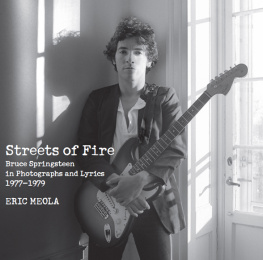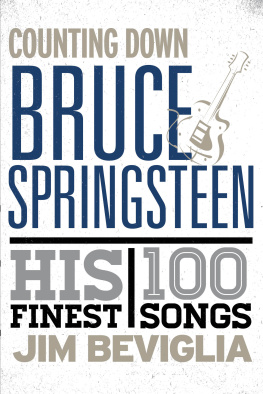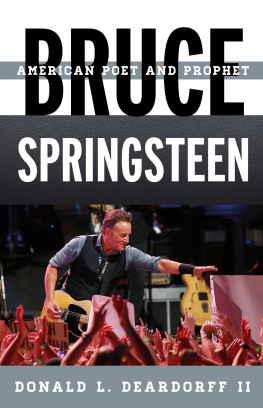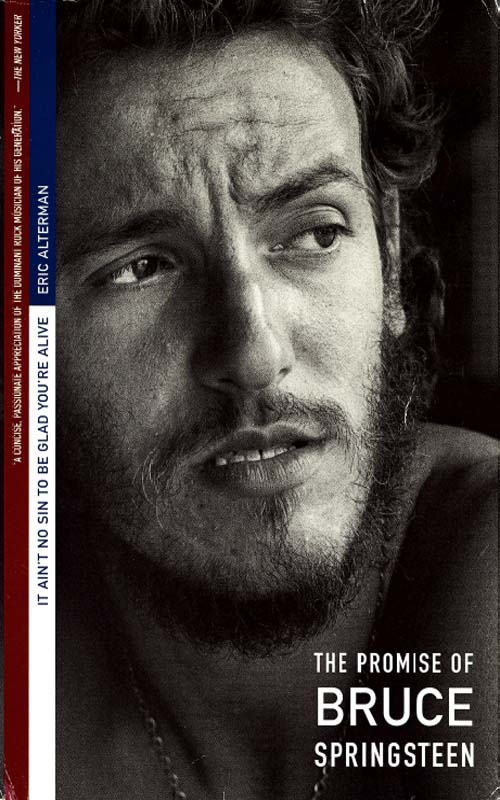Copyright 1999 by Eric Alterman
Afterword copyright 2001 by Eric Alterman
All rights reserved. No part, of this book may be reproduced in any form or by any electronic or mechanical means, including information storage and retrieval systems, without permission in writing from the publisher, except by a reviewer who may quote brief passages in a review.
Picture credits and copyright permissions appear on .
Originally published in hardcover
by Little, Brown and Company, October 1999
Hachette Book Group
237 Park Avenue
New York, NY 10017
Visit our website at www.HachetteBookGroup.com
www.twitter.com/littlebrown
First eBook Edition: January 2010
ISBN: 978-0-7595-2590-0
Acclaim for Eric Altermans
It Aint No Sin to Be
Glad Youre Alive
The Promise of Bruce Springsteen
No mere book can take the place of a ticket to Bruces recent sold-out tour, but It Aint No Sin to Be Glad Youre Alivemight be the next best thing. For someone who would like to know what it is about New Jerseys favorite son that fascinates and inspires. such fervent devotion, It Aint No Sin is as eloquent and sweet a testament as youre likely to find.
Maxim
What a nice surprise to be treated to a uniquely absorbing book on Springsteen. Eric Altermans It Aint No Sin to Be Glad Youre Alive succeeds where no other Springsteen bio has by capturing the singers appeal without merely stringing together old anecdotes. Alterman dutifully takes readers back to Springsteens New Jersey childhood and depicts the singers strained relationship with his dad without resorting to Behind the Music-style sensationalism. He then follows young Bruce through his early career battles and ultimate triumph in the music industry; setting the scene for the breakthrough album Born to Run and its mixed blessing in the songwriters life. Alterman later captures the complexities of the Born in the U.S.A. era with un matched insight. Not only does the author appraise the work and its commercial concessions fairly, he skillfully connects the album with its unique political and social settings, arguing effectively on behalf of Springsteens integrity without sounding like a blind fan. Alterman is fair and eloquent in his appraisal of Springsteens discography. Most important, Alterman shows noble restraint in his discussion of Springsteens private life. While he certainly doesnt shy away from the artists troubled childhood or failed first marriage, the author treats the fragile subject matter properly and avoids painting the singers down moments with a melodramatic brush. Ultimately, he portrays Springsteen as a real person.
Billboard
Clever persuasive intelligent.
John D. Thomas, New York Times Book Review
A well-researched, passionate, musicologically in formed and politically astute appreciation of the great rock n roll artist.
E. L. Doctorow
Alterman deploys biographical detail sparingly but well, always to the purpose: elucidating his subjects extraordinary body of work, which comprises not only hundreds of songs but also thousands of strenuous, exhilarating live performances. This concise, passionate appreciation of the dominant rock musician of his generation makes a case for Springsteens importance as a chronicler of social pain and, through his music, a creator of community: in this persuasive portrait, Springsteen is a mature artist quite consciously guided by a sense of responsibility to his audience, his country, and his own talent.
The New Yorker
A seasoned political journalist and a fervent Bruce Springsteen fan, Alterman crafts a balanced yet passionate bio that plumbs the Bosss artistic origins and achievements.
People
Springsteen is one of the few artists of the last half century who can be called truly original. He looms so large on the landscape of popular music that I am surprised that this book wasnt written before now. It Aint No Sin to Be Glad Youre Alive is fascinating, well researched and serious: three qualities not often found together in biographies of musicians. It ranks with Peter Guralnicks work and is an essential document in evaluating Springsteens legacy.
Rosanne Cash
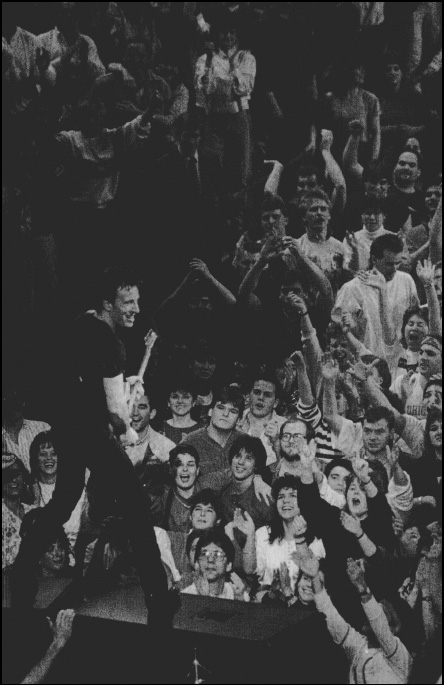
Who Speaks for America? Why Democracy Matters in Foreign Policy (1998)
Sound and Fury: The Making of the Punditocracy (1992 and 1999)
TO EVE ROSE ALTERMAN
Born to run on April 6, 1998
In a world so hard and dirty, so fouled and confused Searching for a little bit of Gods mercy, I found living proof.
O n a rainy late-November afternoon in 1998, I shook hands with Bruce Springsteen. We were introduced by his manager and coproducer, Jon Landau, in the Green Room of The Charlie Rose Show. I was there because I had called Charlie earlier in the day and asked if I could show up for Bruces interview. I had been a guest on his show a few times, and we were friendly in a dinner/cocktail party kind of way, and as Charlie is a nice guy, he said sure. And so that afternoon I was ushered into a little room where Bruce was sitting alone with his acoustic guitar. Landau, who arrived at the same time, came in with me, and said something complimentary about my political writing to Bruce. Looking tan and rested, Bruce stood up from the table to shake my hand and told me he was real glad to meet me. I had been imagining this moment for nearly a quarter century but I still hadnt figured out what to say. During the past twenty-five years, I had driven hundreds of miles, flown across oceans, Raited on overnight ticket lines, lied to my parents and professors, bribed bouncers, flattered girls I wasnt so crazy about, and worse, to see this man perform. But I was a grown-up now. I didnt want to gush; I didnt want to sound like every other smitten fan in the world whose life Bruce had changed. I believed in the art, I reminded myself, not the artist. Still, I wanted to be honest. There were any number of times since I had turned fifteen when I had felt as if Bruce were somehow saving my life. He had proved the one constant between my adoles-cence and my adulthood, between my being the son of my father and the father of my daughter. He had been a source of hope and inspiration, of friendship and fortitude, of therapy and solidarity, of consolation and exhilaration. He still was.
So what did I say? Not much, it turned out. I figured hed heard it all before, and what good would it do, when, really, all he wanted to do was prepare for his interview. I didnt ask for his autograph or try to prolong the conversation artificially. I decided instead to maintain my dignity and simply thank him for everything without going into too much detail about just how much I wanted that word to contain. We shook hands again and I left. An hour later, when the interview was over and Bruce came back into the Green Room, handed him his guitar, and he went out before the cameras to play a blistering acoustic version of Born in the U.S.A. When the song ended, he said good-bye, we shook hands one more time, and Bruce quickly headed down a secret elevator to a waiting Town Car.
Heres what I wanted to say
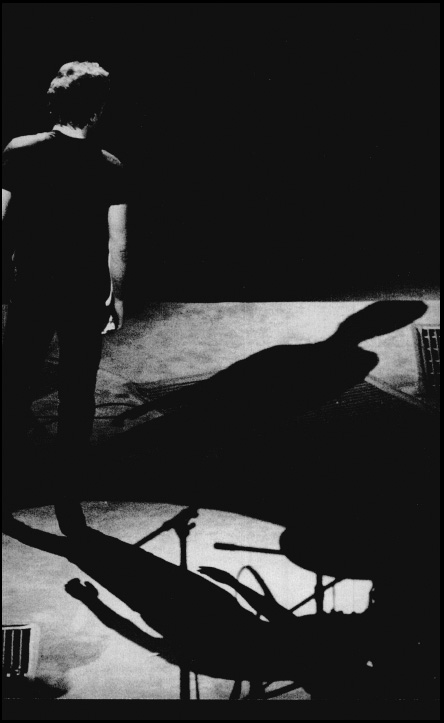
Now every man has the right to live




